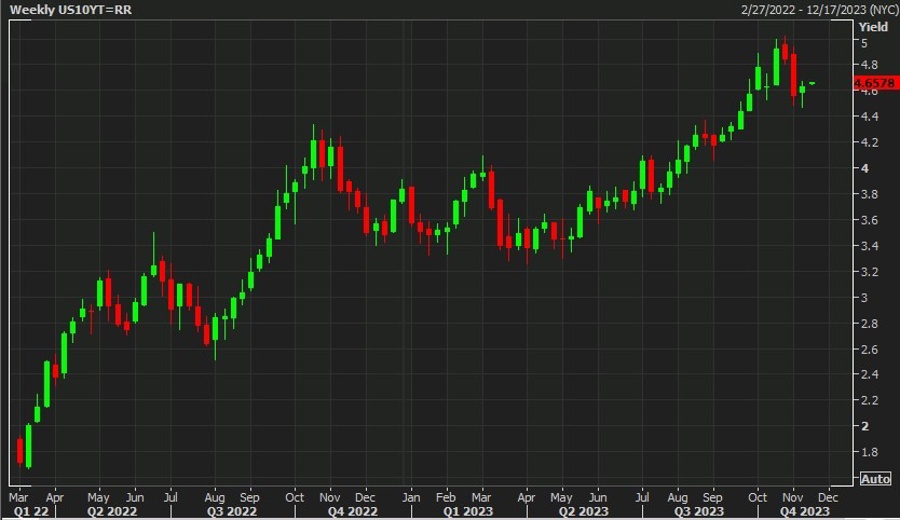The Impact of the Bond Market on Stocks and Risk Assets
An analyst note from Barclays on Friday last week on the cascade lower for bonds:
“There is no magic level of yields that, when reached, will automatically draw in enough buyers to spark a sustained bond rally,”
“In the short term, we can think of one scenario where bonds rally materially. If risk assets fall sharply in the coming weeks.”
“The magnitude of the bond selloff has been so stunning that stocks are arguably more expensive than a month ago, from a valuation standpoint”
“We believe that the current market conditions require caution and a closely monitored approach to investing.”
Expanding on the Topic
The recent volatility in the bond market has sent shockwaves through the financial world, impacting not only bond prices but also stock valuations and other risk assets. As bond yields rise, investors may be less inclined to flock to bonds, leading to a potential sell-off in the bond market.
With bonds becoming less attractive, investors may turn to riskier assets such as stocks in search of higher yields. However, this shift in investment behavior can also lead to overvaluation in the stock market, as mentioned in the Barclays analyst note.
It is crucial for investors to closely monitor market conditions and make informed decisions to navigate these uncertain times. Diversification and risk management are key strategies to weather the storm in a volatile market environment.
How will this affect me?
As an individual investor, the impact of the bond market on stocks and risk assets can affect your portfolio performance and overall investment strategy. Rising bond yields may lead to lower bond prices, potentially impacting your fixed income investments.
On the other hand, overvalued stocks due to the bond market volatility may result in increased market risk and potential losses for equity investors. It is crucial to review your investment portfolio, assess your risk tolerance, and consider adjusting your allocations to navigate the current market conditions.
How will this affect the world?
The ripple effects of the bond market on stocks and risk assets can have a widespread impact on the global economy. A sell-off in the bond market can lead to increased borrowing costs for governments and corporations, affecting economic growth and investment activities.
The interconnected nature of financial markets means that fluctuations in one asset class can spill over to others, potentially triggering a domino effect on the global financial system. It is essential for policymakers, investors, and businesses to closely monitor market developments and implement appropriate measures to mitigate risks and support economic stability.
Conclusion
As the bond market continues to experience volatility, investors should stay vigilant and adopt a cautious approach to investing. Understanding the interplay between bond yields, stock valuations, and risk assets is crucial for navigating the current market environment.
By closely monitoring market conditions, diversifying portfolios, and implementing risk management strategies, investors can position themselves to weather the storm and capitalize on opportunities in a dynamic financial landscape.





